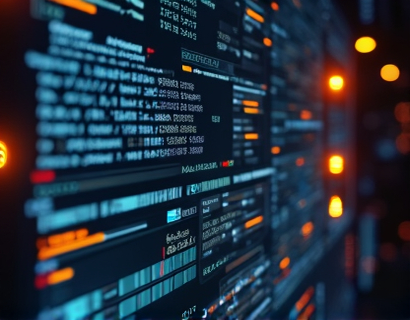Revolutionizing Digital Finance: The Synergy of AI and Crypto
The intersection of artificial intelligence and cryptocurrency is redefining the landscape of digital finance. This convergence is not just a technological advancement but a paradigm shift that promises to make financial services more efficient, secure, and accessible. As we delve into this topic, it's essential to understand the foundational technologies driving this revolution and their implications for the future of finance.
Understanding AI and Cryptocurrency
Artificial intelligence, or AI, refers to the simulation of human intelligence processes by machines, particularly computer systems. These processes include learning, reasoning, and self-correction. In the context of finance, AI is used to analyze vast amounts of data, identify patterns, and make predictions or decisions with minimal human intervention.
Cryptocurrency, on the other hand, is a digital or virtual currency that uses cryptography for security. It operates on a decentralized network, typically a blockchain, which ensures transparency and immutability. The most well-known cryptocurrency is Bitcoin, but there are thousands of others, each with unique features and use cases.
The combination of AI and cryptocurrency creates a powerful synergy. AI can enhance the functionality, security, and usability of cryptocurrencies, while cryptocurrencies provide a novel platform for AI applications, particularly in areas requiring decentralization and transparency.
Enhancing Security with AI
One of the primary concerns in digital finance is security. Cryptocurrencies, despite their robust cryptographic measures, are not immune to threats such as hacking, fraud, and cyberattacks. AI can significantly bolster security by detecting and mitigating these threats in real-time.
Machine learning algorithms can analyze transaction patterns and identify anomalies that may indicate fraudulent activity. For instance, AI systems can monitor blockchain transactions and flag suspicious behavior, such as unusual transaction volumes or patterns that deviate from the norm. This proactive approach can prevent losses and enhance user trust in cryptocurrency platforms.
Furthermore, AI can improve the security of private keys and wallet management. Traditional methods of storing private keys, such as hardware wallets, can be vulnerable to physical theft or technical failures. AI-driven solutions can create dynamic, multi-layered security protocols that adapt to new threats, ensuring that private keys remain secure.
Optimizing Trading and Investment Decisions
AI is revolutionizing the way traders and investors interact with cryptocurrencies. By leveraging advanced analytics and predictive modeling, AI can provide insights that human analysts might miss. This leads to more informed decision-making and potentially higher returns.
One key application is in market analysis. AI algorithms can process vast amounts of data from various sources, including social media, news feeds, and market reports, to gauge sentiment and predict price movements. This real-time analysis can help traders execute trades at optimal times, maximizing profits and minimizing risks.
Robust trading bots powered by AI can automate the trading process, executing trades based on predefined criteria. These bots can operate 24/7, ensuring that opportunities are not missed due to time zone differences or human error. Additionally, AI can adjust strategies based on market conditions, adapting to new information and trends.
Improving User Experience through Personalization
The user experience in digital finance can be significantly enhanced through AI-driven personalization. Cryptocurrency platforms can use AI to understand user preferences and behavior, tailoring services to meet individual needs.
For example, AI can analyze a user's transaction history, investment goals, and risk tolerance to recommend customized investment portfolios. This personalized approach not only improves user satisfaction but also increases the likelihood of successful investments.
Moreover, AI-powered chatbots and virtual assistants can provide instant support and guidance to users. These AI entities can answer queries, explain complex concepts, and assist with transactions, making the platform more accessible and user-friendly.
Enhancing Blockchain Efficiency with AI
Blockchain technology, the backbone of cryptocurrencies, faces challenges related to scalability and efficiency. Transaction processing times can be slow, and the network can become congested during peak usage periods. AI can help address these issues by optimizing blockchain operations.
One approach is to use AI for transaction validation and block creation. AI algorithms can prioritize transactions based on factors such as urgency and fee size, ensuring that the most critical transactions are processed first. This can reduce confirmation times and improve overall network performance.
AI can also contribute to the development of more efficient consensus mechanisms. Traditional consensus algorithms, like Proof of Work, are energy-intensive and slow. AI-driven solutions can explore alternative mechanisms that are faster and more environmentally friendly, such as Proof of Stake or hybrid models.
Fraud Detection and Compliance
Fraud and regulatory compliance are significant concerns in the cryptocurrency space. AI can play a crucial role in detecting and preventing fraudulent activities while ensuring adherence to regulatory standards.
AI systems can analyze transaction data to identify patterns indicative of money laundering, tax evasion, or other illicit activities. By continuously learning from new data, these systems become more adept at spotting subtle signs of fraud.
Regulatory compliance is another area where AI shines. Cryptocurrency exchanges and platforms must adhere to various regulations across different jurisdictions. AI can help ensure compliance by monitoring transactions, reporting suspicious activities, and maintaining accurate records. This not only protects the platform but also builds trust with regulators and users.
Decentralized Finance (DeFi) and AI
Decentralized Finance, or DeFi, is an emerging sector that leverages blockchain technology to create financial services without traditional intermediaries. AI can further enhance DeFi by providing sophisticated tools for lending, borrowing, and yield optimization.
AI-driven lending platforms can assess creditworthiness more accurately by analyzing a broader range of data points, including non-traditional credit history. This can make financial services more accessible to underserved populations.
Yield farming, a strategy where users lend or stake cryptocurrencies to earn rewards, can be optimized with AI. Algorithms can identify the most profitable opportunities, manage risk, and automate the process, allowing users to maximize their returns with minimal effort.
Future Prospects and Challenges
The integration of AI and cryptocurrency holds immense potential, but it also comes with challenges. One major concern is the regulatory landscape. As AI and cryptocurrency continue to evolve, regulators will need to adapt to ensure consumer protection and market stability.
Another challenge is the technical complexity. Developing AI systems that can operate effectively in the decentralized and dynamic environment of blockchain requires expertise in both AI and blockchain technologies. Collaboration between experts in these fields will be crucial for overcoming these hurdles.
Despite these challenges, the future looks promising. As AI technologies advance and become more integrated into blockchain ecosystems, we can expect to see more innovative solutions that enhance the security, efficiency, and accessibility of digital finance. The synergy between AI and cryptocurrency is poised to transform the financial industry, offering new opportunities and redefining traditional concepts.
In conclusion, the convergence of AI and cryptocurrency is not just a technological trend but a fundamental shift in how we approach finance. By harnessing the power of intelligent solutions, we can create a more secure, efficient, and inclusive financial system for the future.










































